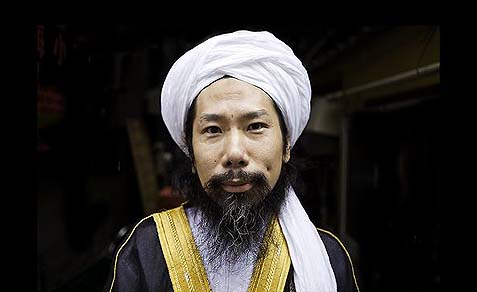
Q. Why Are There No Muslim Terrorists in Japan?
By Steve Sailer
01/01/2016
A. Because there are virtually no Muslims in Japan.
And all strata of Japan, from the prime minister to the working class, intend to keep it that way.
From the Jewish Press:
The Land without MuslimsThe Japanese do not feel the need to apologize to Muslims for the negative way in which they relate to Islam.
By: Dr. Mordechai Kedar
Published: May 19th, 2013
… there is a country in the world whose official and public approach to the Muslim matter is totally different. This country is Japan. This country keeps a very low profile on all levels regarding the Muslim matter: On the diplomatic level, senior political figures from Islamic countries almost never visit Japan, and Japanese leaders rarely visit Muslim countries. The relations with Muslim countries are based on concerns such as oil and gas, which Japan imports from some Muslim countries. The official policy of Japan is not to give citizenship to Muslims who come to Japan, and even permits for permanent residency are given sparingly to Muslims.
Japan forbids exhorting people to adopt the religion of Islam (Dawah), and any Muslim who actively encourages conversion to Islam is seen as proselytizing to a foreign and undesirable culture. Few academic institutions teach the Arabic language. It is very difficult to import books of the Qur’an to Japan, and Muslims who come to Japan, are usually employees of foreign companies. In Japan there are very few mosques. The official policy of the Japanese authorities is to make every effort not to allow entry to Muslims, even if they are physicians, engineers and managers sent by foreign companies that are active in the region. Japanese society expects Muslim men to pray at home.
Japanese companies seeking foreign workers specifically note that they are not interested in Muslim workers. And any Muslim who does manage to enter Japan will find it very difficult to rent an apartment. Anywhere a Muslim lives, the neighbors become uneasy. Japan forbids the establishment of Islamic organizations, so setting up Islamic institutions such as mosques and schools is almost impossible. In Tokyo [population 13.35 million] there is only one imam.
In contrast with what is happening in Europe, very few Japanese are drawn to Islam. If a Japanese woman marries a Muslim, she will be considered an outcast by her social and familial environment. There is no application of Shari’a law in Japan. There is some food in Japan that is halal, kosher according to Islamic law, but it is not easy to find it in the supermarket.
The Japanese approach to Muslims is also evidenced by the numbers: in Japan there are 127 million residents, but only ten thousand Muslims, less than one hundredth of a percent. The number of Japanese who have converted is thought to be few. In Japan there are a few tens of thousands of foreign workers who are Muslim, mainly from Pakistan, who have managed to enter Japan as workers with construction companies. However, because of the negative attitude towards Islam they keep a low profile.
There are several reasons for this situation:
First, the Japanese tend to lump all Muslims together as fundamentalists who are unwilling to give up their traditional point of view and adopt modern ways of thinking and behavior. In Japan, Islam is perceived as a strange religion, that any intelligent person should avoid.
Second, most Japanese have no religion, but behaviors connected with the Shinto religion along with elements of Buddhism are integrated into national customs . In Japan, religion is connected to the nationalist concept, and prejudices exist towards foreigners whether they are Chinese, Korean, Malaysian or Indonesian, and Westerners don’t escape this phenomenon either. There are those who call this a “developed sense of nationalism” and there are those who call this “racism”. It seems that neither of these is wrong.
And third, the Japanese dismiss the concept of monotheism and faith in an abstract god, because their world concept is apparently connected to the material, not to faith and emotions. It seems that they group Judaism together with Islam. Christianity exists in Japan and is not regarded negatively, apparently because the image of Jesus perceived in Japan is like the images of Buddha and Shinto.
The most interesting thing in Japan’s approach to Islam is the fact that the Japanese do not feel the need to apologize to Muslims for the negative way in which they relate to Islam.
Great article.
Read the rest here.
